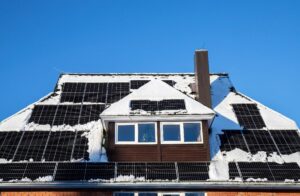By Cameron Mitchell
Solution 105 Consulting Ltd.
“THE BIG MELT”
 Sunny times ahead as Alberta snow continues to disappear. Looks like spring has arrived. Alberta spot electricity rates have dropped dramatically, as it seems the cold weather is in the rearview mirror. March and April forward rates suggest those months will come in around 3.5 cents per kWh. The remainder of 2025 and 2026 are trading near 5 cents per kWh. Meanwhile, floating February electricity commodity rates came in around 6 cents per kWh. As floating rates are expected to beat fixed rate options, we recommend a change to a floating option.
Sunny times ahead as Alberta snow continues to disappear. Looks like spring has arrived. Alberta spot electricity rates have dropped dramatically, as it seems the cold weather is in the rearview mirror. March and April forward rates suggest those months will come in around 3.5 cents per kWh. The remainder of 2025 and 2026 are trading near 5 cents per kWh. Meanwhile, floating February electricity commodity rates came in around 6 cents per kWh. As floating rates are expected to beat fixed rate options, we recommend a change to a floating option.
The spot market for natural gas averaged roughly $2.40/GJ for February. The forward market for natural gas has increased compared to last month. Short term rates are trading under $2.40 /GJ until winter of 2025. This being the case, we suggest moving to a floating rate if your current fixed rate is above $3.00/GJ. Forward market gas rates for March 2025 are trading near $2.00/GJ, the remainder of 2025 around $2.35/GJ, and 2026 to 2028 are in the $3.30/GJ range.
WE RECOMMEND:
Natural Gas Only: Unless you have a longer-term fixed rate under $3.00/GJ, we recommend getting onto a floating rate.
- Direct Energy REGULATED Services. DERS. This is the default, no retailer rate. It is a floating rate. Check with your current provider to ensure there are no cancellation fees, etc. This rate is very close to spot plus $0.117 per GJ. The monthly admin fee is about $10.65/month.
- Encor by EPCOR has a floating rate of spot plus $1/GJ. The monthly admin fee is about $8.20/month. $50 referral credit linked here.
Electricity Only: Unless you have a fixed rate contract below 6 cents per kWh, we recommend considering a floating rate:
Best floating rate option:
Encor by EPCOR has a floating rate of spot plus 1.00 cents/kWh. The monthly admin fee is about $8.20/month. $50 referral credit linked here.
AT MY HOUSE (making a move)!
I signed my electricity up with the fixed 6.69 cents per kWh winter offer from Empowering Communities Energy starting December 1, 2024 (which only runs to April 30, 2025). I was mainly concerned about the possibility of high winter rates, but I have now moved from this option to a floating option on March 1, 2025. The forwards market for March is trading near 3.5 cents per kWh, and trading below 6 cents per kWh until 2027 so I made the move to Encor by EPCOR. That said, I will continue to watch for fixed rate opportunities.
NATURAL GAS
 For gas, I plan to continue floating with Direct Energy REGULATED Services. DERS.
For gas, I plan to continue floating with Direct Energy REGULATED Services. DERS.
If something better comes along in the future, these plans can be terminated at no cost.
The retail offers we have seen are no better than $3.29/GJ. Short term forward market pricing is now below $2.50/GJ, with March 2024 expected to average around $2.00/GJ, and pricing below $3.00/GJ until December 2025. So, for gas, we recommend a floating rate. In general, a good option is to go with Direct Energy REGULATED Services (DERS)… remember “Regulated Service”. If you are not with DERS now, you will automatically go there if you terminate your current gas contract. Make sure there are no termination fees! There may also be a small enrollment fee to get on with DERS.
DERS has an admin fee of about $10.65 per month and their floating rate includes a margin of roughly $0.117 per GJ. Still, this is better than most floating margins which average over $0.40 per GJ.
For March, the Direct Energy Regulated Services (“DERS”) rate is $2.446/GJ. Approximately $0.41/GJ of this figure is to recollect previous period undercharges. We expect April’s DERS rate will be approximately $2.00/GJ.
ELECTRICITY
 As the forward market is suggesting electricity rates for March and April may be in the 3.5 cent per kWh range, we recommend people with fixed rates higher than 6 cents per kWh to make a move to a floating rate option. Be sure to check to see if there are any cancellation fees. The Encor by EPCOR floating plan is a good one. $50 referral credit linked here.
As the forward market is suggesting electricity rates for March and April may be in the 3.5 cent per kWh range, we recommend people with fixed rates higher than 6 cents per kWh to make a move to a floating rate option. Be sure to check to see if there are any cancellation fees. The Encor by EPCOR floating plan is a good one. $50 referral credit linked here.
February averaged about 6 cents/kWh on the floating index. The remainder of 2025 and 2026 are trading in the 5.0 cents per kWh.
Just to help put things into perspective, all that we are talking about here is the commodity rates and costs, not the delivery and other regulated charges. An average house might use around 9,000 kWh and 100 GJ over a year.
COMMERCIAL USERS
 And for those of you who are not residential users, give us a call. We are now seeing much better pricing for commercial users compared to residential users, and we can help get the lowest rates for your business.
And for those of you who are not residential users, give us a call. We are now seeing much better pricing for commercial users compared to residential users, and we can help get the lowest rates for your business.